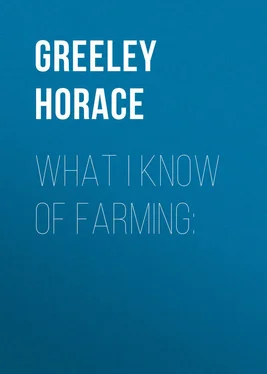Horace Greeley - What I know of farming:
Здесь есть возможность читать онлайн «Horace Greeley - What I know of farming:» — ознакомительный отрывок электронной книги совершенно бесплатно, а после прочтения отрывка купить полную версию. В некоторых случаях можно слушать аудио, скачать через торрент в формате fb2 и присутствует краткое содержание. Жанр: foreign_antique, foreign_prose, foreign_language, на английском языке. Описание произведения, (предисловие) а так же отзывы посетителей доступны на портале библиотеки ЛибКат.
- Название:What I know of farming:
- Автор:
- Жанр:
- Год:неизвестен
- ISBN:нет данных
- Рейтинг книги:4 / 5. Голосов: 1
-
Избранное:Добавить в избранное
- Отзывы:
-
Ваша оценка:
- 80
- 1
- 2
- 3
- 4
- 5
What I know of farming:: краткое содержание, описание и аннотация
Предлагаем к чтению аннотацию, описание, краткое содержание или предисловие (зависит от того, что написал сам автор книги «What I know of farming:»). Если вы не нашли необходимую информацию о книге — напишите в комментариях, мы постараемся отыскать её.
What I know of farming: — читать онлайн ознакомительный отрывок
Ниже представлен текст книги, разбитый по страницам. Система сохранения места последней прочитанной страницы, позволяет с удобством читать онлайн бесплатно книгу «What I know of farming:», без необходимости каждый раз заново искать на чём Вы остановились. Поставьте закладку, и сможете в любой момент перейти на страницу, на которой закончили чтение.
Интервал:
Закладка:
Again: Many farmers have fields that must await the pleasure of Nature to fit them for thorough cultivation. Here is a field – sometimes a whole farm – which, if partially divested of the primitive forest, is still thickly dotted with obstinate stumps and filled with green, tenacious roots, which could only be removed at a heavy, perhaps ruinous, cost. A rich man might order them all dug out in a month, and see his order fully obeyed; but, except to clear a spot for a garden or under very peculiar circumstances, it would not pay; and a poor man cannot afford to incur a heavy expense merely for appearance's sake, or to make a theatrical display of energy. In the great majority of cases, he who farms for a living can't afford to pull green stumps, but must put his newly-cleared land into grass at the earliest day, mow the smoother, pasture the rougher portions of it, and wait for rain and drouth, heat and frost, to rot his stumps until they can easily be pulled or burned out as they stand.
So with regard to a process I detest, known as Pasturing. I do firmly believe that the time is at hand when nearly all the food of cattle will, in our Eastern and Middle States, be cut and fed to them – that we can't afford much longer, even if we can at present, to let than roam at will over hill and dale, through meadow and forest, biting off the better plants and letting the worse go to seed; often poaching up the soft, wet soil, especially in Spring, so that their hoofs destroy as much as they eat; nipping and often killing in their infancy the finest trees, such as the Sugar Maple, and leaving only such as Hemlock, Red Oak, Beech, &c., to attain maturity. Our race generally emerged from savageism and squalor into industry, comfort and thrift, through the Pastoral condition – the herding, taming, rearing and training of animals being that department of husbandry to which barbarians are most easily attracted: hence, we cling to Pasturing long after the reason for it has vanished. The radical, incurable vice of Pasturing – that of devouring the better plants and leaving the worse to ripen and diffuse seed – can never be wholly obviated; and I deem it safe to estimate that almost any farm will carry twice as much stock if their food be mainly cut and fed to them as it will if they are required to pick it up where and as it grows or grew. I am sure that the general adoption of Soiling instead of Pasturing will add immensely to the annual product, to the wealth, and to the population, of our older States. And yet, I know right well that many farms are now so rough and otherwise so unsuited to Soiling as to preclude its adoption thereon for many years to come.
Let me indicate what I mean by Good Farming, through an illustration drawn from the Great West:
All over the settled portions of the Valley of the Upper Mississippi and the Missouri, there are large and small herds of cattle that are provided with little or no shelter. The lee of a fence or stack, the partial protection of a young and leafless wood, they may chance to enjoy; but that it is a ruinous waste to leave than a prey to biting frosts and piercing north-westers, their owners seem not to comprehend. Many farmers far above want will this Winter feed out fields of Corn and stacks of Hay to herds of cattle that will not be one pound heavier on the 1st of next May than they were on the 1st of last December – who will have required that fodder merely to preserve their vitality and escape freezing to death. It has mainly been employed as fuel rather than as nourishment, and has served, not to put on flesh, but to keep out frost.
Now I am familiar with the excuses for this waste; but they do not satisfy me. The poorest pioneer might have built for his one cow a rude shelter of stakes, and poles, and straw or prairie-grass, if he had realized its importance, simply in the light of economy. He who has many cattle is rarely without both straw and timber, and might shelter his stock abundantly if he only would. Nay, he could not have neglected or omitted it if he had clearly understood that his beasts must somehow be supplied with heat, and that he can far cheaper warm them from without than from within.
The broad, general, unquestionable truths, on which I insist in behalf of Good Farming are these; and I do not admit that they are subject to exception:
I. It is very rarely impracticable to grow good crops, if you are willing to work for them. If your land is too poor to grow Wheat or Corn, and you are not yet able to enrich it, sow Rye or Buckwheat; if you cannot coax it to grow a good crop of anything, let it alone; and, if you cannot run away from it, work out by the day or month for your more fortunate neighbors. The time and means squandered in trying to grow crops, where only half or quarter crops can be made, constitute the heaviest item on the wrong side of our farmers' balance-sheets; taxing them more than their National, State, and local governments together do.
II. Good crops rarely fail to yield a profit to the grower. I know there are exceptions, but they are very few. Keep your eye on the farmer who almost uniformly has great Grass, good Wheat, heavy Corn, &c., and, unless he drinks, or has some other bad habit, you will find him growing rich. I am confident that white blackbirds are nearly as abundant as farmers who have become poor while usually growing good crops.
III. The fairest single test of good farming is the increasing productiveness of the soil. That farm which averaged twenty bushels of grain to the acre twenty years ago, twenty-five bushels ten years ago, and will measure up thirty bushels to the acre from this year's crop, has been and is in good hands. I know no other touchstone of Farming so unerring as that of the increase or decrease from year to year of its aggregate product. If you would convince me that X. is a good farmer, do not tell me of some great crop he has just grown, but show me that his crop has regularly increased from year to year, and I am satisfied.
– I shall have more to say on these points as I proceed. It suffices for the present if I have clearly indicated what I mean by Good and what by Bad Farming.
III.
WHERE TO FARM
When my father was over sixty years old, and had lived some twenty years in Erie County, Pennsylvania, he said to me: "I have several times removed, and always toward the West; I shall never remove again; but, were I to do so, it would be toward the East. Experience has taught me that the advantages of every section are counterbalanced by disadvantages, and that, where any crop is easily produced, there it sells low, and sometimes cannot be sold at all. I shall live and die right here; but, were I to remove again, it would not be toward the West."
This is but one side of a truth, and I give it for whatever it may be worth. Had my father plunged into the primitive forest in his twenty-fifth rather than his forty-fifth year, he would doubtless have become more reconciled to pioneer life than he ever did. I would advise no one over forty years of age to undertake, with scanty means, to dig a farm out of the dense forest, where great trees must be cut down and cut up, rolled into log-heaps, and hurried to ashes where they grew. Where half the timber can be sold for enough to pay the cost of cutting, the case is different; but I know right well that digging a farm out of the high woods is, to any but a man of wealth, a slow, hard task. Making one out of naked prairie, five to ten miles from timber, is less difficult, but not much. He who can locate where he has good timber on one side and rich prairie on the other is fortunate, and may hope, if his health be spared, to surround himself with every needed comfort within ten years. Still, the pioneer's life is a rugged one, especially for women and children; and I should advise any man who is worth $2,000 and has a family, to buy out an "improvement" (which, in most cases, badly needs improving) on the outskirt of civilization, rather than plunge into the pathless forest or push out upon the unbroken prairie. I rejoice that our Public Lands are free to actual settlers; I believe that many are thereby enabled to make for themselves homes who otherwise would have nothing to leave their children; yet I much prefer a home within the boundaries of civilization to one clearly beyond them. There is a class of drinking, hunting, frolicking, rarely working, frontiersmen, who seem to have been created on purpose to erect log cabins and break paths in advance of a different class of settlers, who regularly come in to buy them out and start them along after a few years. I should here prefer to follow rather than lead. If Co-operation shall ever be successfully applied to the improvement of wild lands, I trust it may be otherwise.
Читать дальшеИнтервал:
Закладка:
Похожие книги на «What I know of farming:»
Представляем Вашему вниманию похожие книги на «What I know of farming:» списком для выбора. Мы отобрали схожую по названию и смыслу литературу в надежде предоставить читателям больше вариантов отыскать новые, интересные, ещё непрочитанные произведения.
Обсуждение, отзывы о книге «What I know of farming:» и просто собственные мнения читателей. Оставьте ваши комментарии, напишите, что Вы думаете о произведении, его смысле или главных героях. Укажите что конкретно понравилось, а что нет, и почему Вы так считаете.












